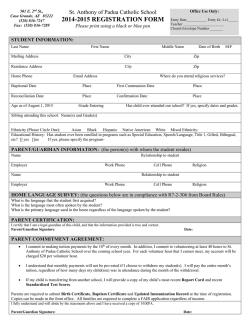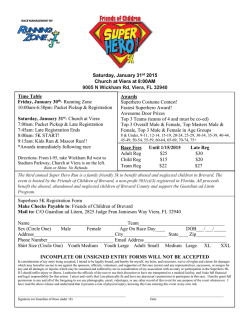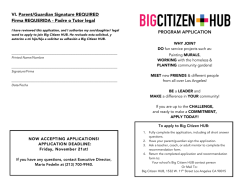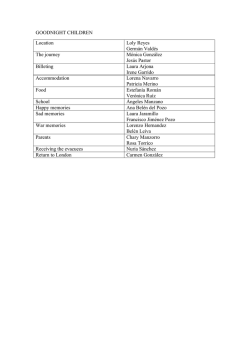
Local Newsletter - The North Carolina Court System
Wake County Guardian ad Litem Program 919-792-5350 www.wakecountygal.org Raleigh, NC District 10 District Administrator Naeime Livingston 792-5352 Attorney Advocates Reginald O’Rourke 792-5356 David Hord 919-792-5354 Program Supervisors Fonda Lyons-Cousar 792-5357 Margaret Hertzler 792-5355 Cheryl Hanes 792-5359 Ernest Wilder 792-5358 Program Assistant Carrie Stopka 792-5353 INSIDE THIS ISSUE: Spotlight on Austin Connors 2 What Is…? 3 A Child’s Sense of Time 4 NC LINKS 5 Wake County Guardian ad Litem Program February, 2015 Newsletter Children Represented by The Wake County Guardian ad Litem Program: The Numbers are Growing Year Children Entering Care Number of Hearings 2011 289 2489 2012 317 2823 2013 333 3019 2014 352 3423 The number of children entering care on the above chart does not reflect the number of children who were already receiving representation by this program. During the month of January 2015, 40 children came into care due to allegations of abuse and neglect. Confidentiality 6 Recommended Readings Up-Coming Events 7 Volunteer Birthday’s Welcoming Mr. Ian Jagger to the Wake County Guardian ad Litem Program. Mr. Jagger was swornin by the Honorable Judge Keith Gregory on Thursday, January 29th, 2015. May not have told you lately, but hope you know it's true, that every day we're grateful for a volunteer like you! Wake County Guardian ad Litem Program Staff PAGE 2 Spotlight on Austin Connors Volunteer Child Advocate Since 2006 Looking back on my childhood we played games outside, chased “lightning bugs” and visited with neighbors and friends as they sat outside on porches and under shade trees. Televisions and air conditioning were a rarity in those days, so we went outside for social interaction. Pleasant childhood memories are wonderful. Except for a few ghost stories told in the darkness by some of the older children, I do not remember being frightened or feeling uncomfortable about my safety either outside or in my home. What a gift! Among the tragedies for the children we serve as a Guardian ad Litem volunteers is the fact that many of them have been robbed of wonderful memories that should be generated in their younger years and enrich their lives forever. In childhood, some have had to encounter situations that at best should be reserved for adulthood and at worst ought never be a part of their experience. What a tragedy! From childhood I moved to college, graduate school, the military, and more graduate school. My professional career brought me to Raleigh to head a consortium of the colleges and universities in Raleigh called Cooperating Raleigh Colleges. Later I served on the staff of Governor James B. Hunt, Jr., seeking to implement his statewide emphasis on volunteerism. In 1985 my wife and I began operating one and then a second pre-school facility, serving young children and their parents. For eleven years, prior to retirement, I was the executive for Children and Family Services Association-NC, working in policy and training for agencies that serve children and families. Becoming a GAL volunteer in the fall of 2006 was a natural extension of both volunteer and professional interests. While in the military, I tutored youth in a state correctional facility. I have taught church school for many years at various levels. Professionally I have worked with children directly, with adults experiencing the joys and frustrations of parenting, and with public policy matters related to children. Volunteers have many good and varied motivations that bring them to a specific assignment. Some see volunteering as an extension of their faith commitment and some recognize the advantages and successes they have enjoyed and want to give back to society. Others see volunteering as an extension of the skills that brought them into a particular field of employment. On the contrary, for some, volunteering allows them to contribute in an area totally different from their employment. For all of us, however, being a GAL volunteer can be a time for building good and positive memories. First and foremost, we seek to be a source of good memories for the children as they come to know our caring, our interest in them, and our work on their part with nothing sought in return. Second, for the adults who have made bad decisions and who are living out the consequences of those decisions, we can also offer memories of fairness, compassion, strength, and dedication to children often caught in the “mess” of complex relationships. Finally, in the good times and tough times of GAL service, I trust that we build good memories for ourselves as well. Memories of children rescued from danger to safety, of smiles and laughter, of the joy of accomplishment, and the satisfaction of acting on our best information and judgment for the best interest of a child. Who could ask for more! What Is...? PAGE CC4: Care Coordination for Children (CC4C) is a free, voluntary program in Wake County designed to help families improve health outcomes for their children from birth to age 5 who qualify for services. CC4C services is provided in Wake County by CC4C Care Manager (nurse or social worker). CC4C Care Managers will assess current and ongoing medical and family needs and concerns. Concerns and services may include, but are not limited to: developmental delay, disability, chronic illness, social and emotional stress and disorders, periodic medical, behavioral, developmental and psychosocial evaluation. The CC4C Care Managers will establish a plan of care and a schedule of contacts with the family based on the child’s individual situation. The CC4C Care Manger will be working closely with the child’s doctor to make sure the family is able to keep medical appointments and to follow the doctor’s medical advice. For more information please call 919-250-1154. Concurrent Permanency Planning: Concurrent Permanency Planning is a required and structured social work approach to moving children more quickly from the uncertainty of foster care to the stability and security of a permanent family setting. Concurrent Permanency Planning approach was designed as an alternative to sequential permanency planning for children placed in foster care. This approach requires the child welfare agencies in North Carolina to work toward family reunification, while at the same time requiring them to establish an alternative or back-up permanency plan from the very beginning in case the child cannot safely return to the care and custody of their biological parents. The Concurrent Permanency Planning was designed to decrease children’s length of stay in foster care as well as reducing their number of moves and relationship disruptions while in care. CARS Agreement: Many youth who age out of the foster care system go into a Contractual Agreement for Residential Services, or CARS, agreement with the state. The CARS agreement allows the youth to stay in their foster care home and receive state support while they are enrolled in a full-time program of academic or vocational training, or accepted for full-time enrollment for the next term in an academic or vocational program. 3 PAGE A Child’s Sense of Time A child's sense of time is very different from an adult's. If an infant or toddler waits for a hearing, that wait is a significant portion of his/her life. Likewise, a school-aged child who is uprooted from family, school, and friends does not view a month or three or four as a short period of time. As child advocates we must keep in mind a child's sense of time, and work to achieve permanency for a child as quickly as possible. Principles of Permanence: Constantly examine your own value system. Carefully examine the child protection agency case record. Ask the parents why they think they lost custody of their children. Recognize that the "system" should be operating on the child's sense of time. Understand grief and what moving and waiting do to children. Stay child-centered and family-focused. Recognize parents' strengths, but do not ignore their failings. Be a team player. Aggravate the system if you have to be a catalyst for change. Work for justice—act with mercy. A Always have as your goal a safe and permanent home for each child D Dig for details and facts in conducting your investigation V Value and respect all legal parties and participants O Observe or visit each child monthly C Consult with GAL staff to overcome obstacles to achieve permanency A Act with Urgency T Tell the judge at each hearing the needs and wishes of the child E Ensure that the court reports promote and protect the best interest of each child. 4 PAGE North Carolina LINKS Program Services Available to Older Youth in Care The NC LINKS program is designed to provide services and resources to all youth in foster care age 16 to 18 and to those young adults who are between the ages of 18 and 21 and are participating in a CARS agreement, as well as to young adults who aged out of foster care at age 18 and are not participating in a CARS agreement. In order for a youth or young adult to receive LINKS services or funding, he or she must be a willing and active participant in the assessment, planning, and service implementation processes. The NC LINKS program is comprised of several elements: An assessment of the youth's strengths as well as their needs for further information and training. The assessment is completed by the youth and his or her caregiver. A plan that is based on the assessment and which includes the youth/young adult's interests and goals as well as their responsibilities for fulfilling the plan. Services outlined in the plan which ar e dir ected towar d helping the youth or young adult to achieve positive outcomes. Desired outcomes for all young adults exiting the foster care system are: Sufficient income to meet daily needs A safe and stable place to live Sufficient academic and/or vocational training that is in keeping with the youth's goals, interests and abilities Connections to and emotional support from a variety of adults outside of the public child welfare system Avoidance of High Risk Behaviors Postponement of parenthood until emotionally and financially capable of parenting Access to routine mental health, health and dental health care Services are individualized but usually include group activities; participation in community activities that promote maturity; one-on-one instruction; volunteer activities; employment; specific life skills training; exposure to educational and vocational resources, etc. For more information about LINKS services offered by Wake County Human Services please call Antwan Pickett at 919-212-8415. 5 PAGE Confidentiality and the Guardian ad Litem Volunteer As a Guardian ad Litem Volunteer Advocate, you have access to confidential information about children and people involved in those children’s lives. Please keep in mind that as GAL advocate you may not release this information except to the child, GAL Program staff, the social worker, the court, and others as instructed by law or local court rules. There are strict guidelines about who can have access to confidential information. By law, GAL volunteers must keep all information regarding the case confidential and make no disclosure, except by court orders or unless provided by law. When in doubt, discuss any confidentiality concerns with your Guardian ad Litem Program Supervisor. Recommended Readings I Speak for This Child By: Gay Courter Three Little Words By: Ashley Rhodes-Couter Castaway Kid By: R.B. Mitchell Special thanks to the Wake County Adoption Resource Team and The Wake County Adoption Clerks of Court for facilitating our January In-Service Training. We also thank those who attended this informative training. 6 PAGE Up-Coming Events Wednesday, February 11th, Wake County Guardian ad Litem Supper Club: The Supper Club will be held at Caffé Luna - 136 East Hargett St. Downtown Raleigh, 27601, in Raleigh at 6:00 PM. All our volunteers, volunteers-in-training, staff, friends of the program and their spouses/significant others are invited. If you plan to attend, please send an email to Fred Ames at [email protected] to let Mr. Ames know if you plan to attend, and if you plan to bring someone with you. Please respond to Mr. Ames no later than Tuesday, February 10th. If you have to change your plans, please be sure to let Mr. Ames know of the change as far in advance as possible. Friday, March 6th, Wake County Guardian ad Litem Program In-Service Training: Drugs Uncovered-What Adults Need to Know: This in-service training will be held at the Alice Aycock Poe Center for Health and Education located at 224 Sunnybrook Road Raleigh, 27610 from 10:00 AM to 12:00 PM. Please let Carrie Stopka know if you would like to attend. Friday, April 17th, Wake County Guardian ad Litem Volunteer Appreciation Luncheon from 12:00 to 2:00 PM. Mor e infor mation will be for thcoming. Special thanks to the Friends of Wake Guardian ad Litem Association for their continuing support of families and children of Wake County. www.friendsofwakegal.org Happy Birthday to Our Volunteer Child Advocates! Gwendolyn Marilyn Marie Sally Melissa Cynthia Barbara Marianita Jordan Keri Frank Lesley Lynn Rebekah Regina Kendra Linda Gavin Jackie Peter Deborah Lydia 7
© Copyright 2026








